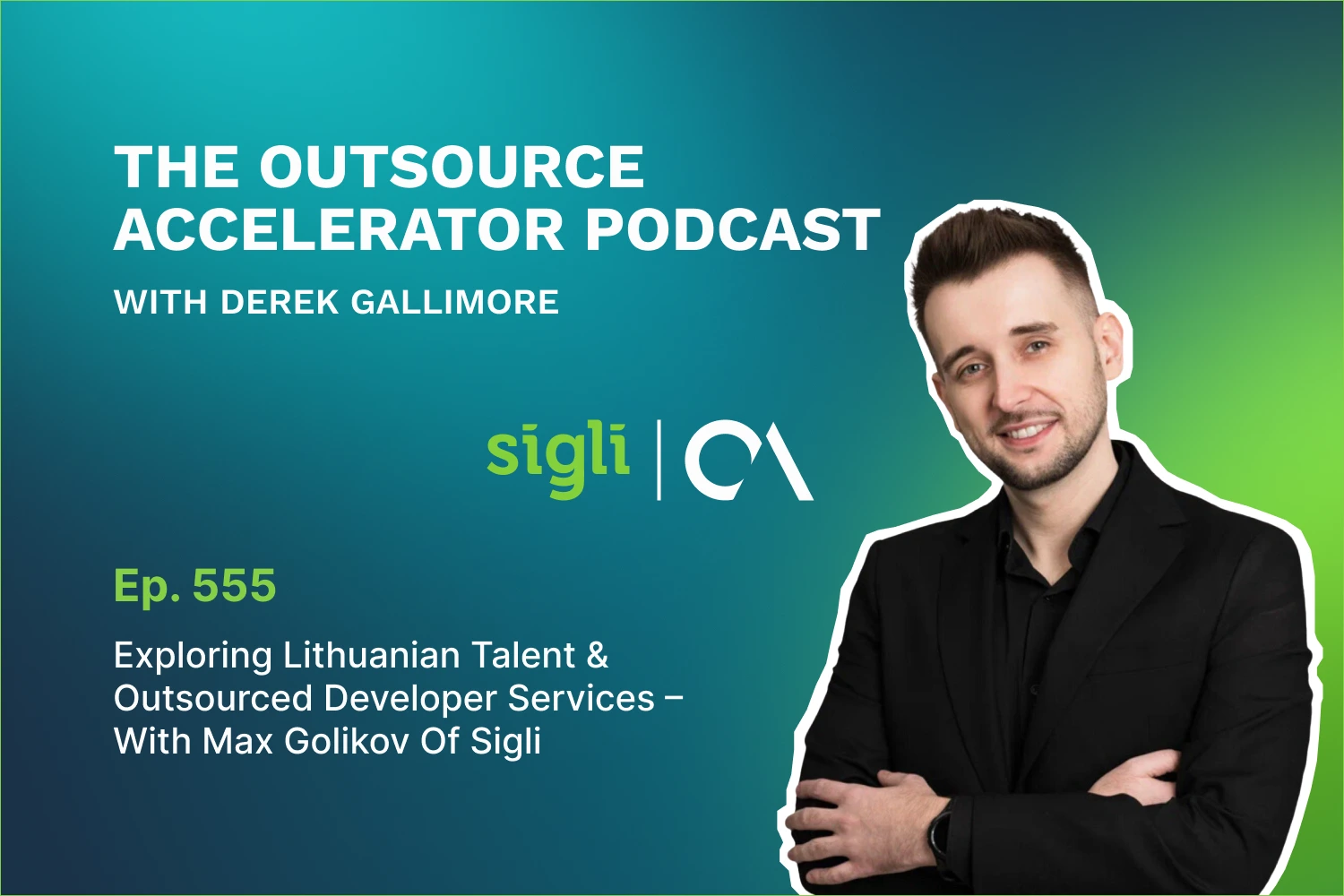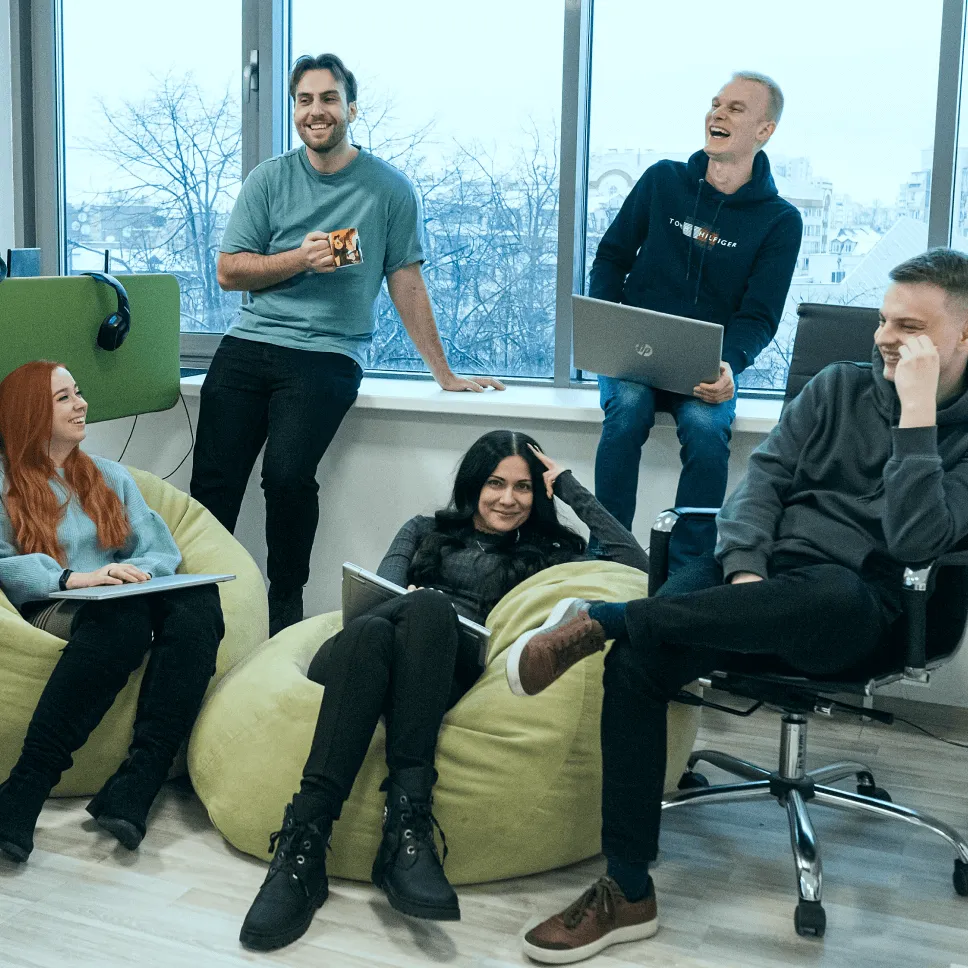

Business & Technology

November 3, 2025

8 min read

If you like listening to business and tech-related podcasts, you may know Sigli’s CBDO, Max Golikov, as a host of the Innovantage podcast. This time, he changed his role and participated in the podcast not as a host but as a guest. He joined Derek Gallimore at the Outsource Acelerator Podcast to talk about Sigli’s business model, Lithuanian outsourcing and staffing potential, as well as the role of AI in the business world.
Today, Sigli is a team of around 100 people, focused on delivering high-quality software solutions across Europe, mainly in the Benelux region, the UK, and the US.
The company offers software development services and can build software or its pieces tailored to the requirements of its clients. But at the same time, if any businesses require additional workforce for their projects, Sigli can provide its specialists to work for them remotely as part of their teams. In general, the company can address all business needs in between these two extremes as well.
In software development, companies often choose between two models: outsourcing entire projects or augmenting their existing teams with skilled engineers. Both approaches have their strengths, but they fit different needs.
Outsourcing works well for smaller companies or clearly defined projects within larger organizations. In these cases, goals, budgets, and timelines can be set in advance.
Staff augmentation (or outstaffing), on the other hand, is better suited for mid- to large-sized businesses with long-term, complex projects. These initiatives can last for years, involve dozens of people across multiple countries, and integrate deeply into core business processes. Outsourcing an entire project of that scale isn’t realistic. However, adding specialized engineers to strengthen in-house teams is practical and effective.
Outstaffing gives companies access to top talent with niche expertise, without the overhead of recruitment, infrastructure, or long onboarding cycles. It also offers the flexibility to scale teams up or down as business needs evolve.
Sigli has always primarily cooperated with mid-sized to larger businesses. That’s why the majority of projects its experts usually work on are pretty large.
Given this, the balance between the two models is roughly 60/40, with staff augmentation prevailing. Often, engagement begins as project-based outsourcing. But it can gradually evolve into a seamless outstaffing arrangement. In this model, Sigli either provides entire teams that work directly with the client’s management or individual professionals who integrate smoothly into the client’s existing teams.
Moreover, Sigli’s approach adapts to each client’s preferences. Some clients want tight control over the hired team. Others focus mainly on outcomes. In this case, they leave day-to-day management to Sigli’s team.
Sigli is based in Lithuania, a country that is known for its strong technical capabilities and supportive environment for international business. Vilnius, the capital, is home to a diverse mix of nationalities. That’s good proof that the country today is open to foreigners. Despite its small size, Lithuania has a rich history. During the Middle Ages, it was one of the largest kingdoms in Europe. Then, many centuries later, it had its Soviet period. All this shaped its modern development and created a unique social and cultural environment.
Since regaining independence, Lithuania has heavily invested in infrastructure and EU integration. Now, it has excellent connectivity, fast internet, and strong innovation support. Its universities maintain high standards. They partner with European institutions and encourage students to study abroad. Many of them now return and bring new ideas to the country.
Today, Sigli hires a lot of nationalities, both Lithuanians and non-Lithuanians, so the team can embrace a lot of perspectives and opinions.
With its central location and easy travel links across Europe, Lithuania fosters an international, well-educated, and forward-looking society.
Given all this, it’s absolutely fair to say that Lithaunia is a great destination for outsourcing and technology projects. And according to Max, they are always proud to demonstrate the country’s potential to their clients.
Quite often, people believe that any software development company has only “engineers”. But, as Max mentioned, there are important distinctions between various roles, for example, engineers, software developers, and quality assurance specialists.
From the very beginning, Sigli has been building its foundation around true engineering talent and cultivating an engineering mindset across the company.
By “engineers,” Sigli means professionals with higher education and proven expertise in their fields. These people are delivering results in complex, real-world scenarios. At the same time, software developers are more specific, feature-centered roles.
The company’s core focus has always been on web solutions. And while web technologies have changed dramatically over the past decade, good engineers continuously evolve with them. They learn new frameworks and strengthen their skills.
Sigli places a strong emphasis on culture and professional growth. Every engineer in the company, no matter their seniority, is paired with a mentor. This mentor is not a manager but someone more experienced in a specific area that the engineer wants to develop. Their role is to guide, support, and help colleagues build on both strengths and weaknesses.
This system creates a structured path for development while still being personal and flexible. It ensures employees don’t get lost in the overwhelming number of possible directions their careers could take. With this focused guidance, their growth becomes more effective and meaningful.
In this conversation, Derek and Max also discussed AI and its changing role over the past years. As Max noted, AI isn’t new in the tech world. It’s been around in various forms since the earliest computers. What has changed is the hype. Today, everyone seems to be talking about it, even if the broader public often misunderstands what it can realistically do. Large language models (LLMs) like ChatGPT are just one small part of AI. Undoubtedly, they are useful tools, but not the whole story.
Most practical AI relies on solid data. Max explained that at Sigli, data engineering and data science have always been at the core of what they do. Real AI applications, including but not limited to predictions, machine learning, and computer vision, depend on quality data. Without it, even the most advanced tools won’t deliver results. LLMs can provide insights and guidance, but the backbone of any AI project is still the data.
A recent study claimed that engineers believe AI tools like Cursor make them about 40% more efficient. In reality, the research suggested the opposite. Their efficiency actually drops by around 30%, as engineers spend more time interacting with AI than directly solving problems.
However, this view oversimplifies the nature of engineering work. For experienced engineers, the biggest challenges are not in writing lines of code but in solving complex architectural problems with many interdependencies. Measuring efficiency in such cases is nearly impossible.
Writing code is only a small part of the job. From this perspective, their work can be compared with the work of writers. Simply being able to write doesn’t make someone a great author. A true writer creates narratives that resonate, just as a great engineer sees into systems and uncovers non-obvious solutions.
In this context, large language models are helpful mainly for routine tasks. They can generate usable code, but only when you give precise instructions. This can greatly save time on repetitive work.
Client demand for AI solutions has been steadily growing since the hype began, but the nature of requests has shifted. According to Max, in the early stages, many clients approached with ambitious, high-level ideas about transforming their entire business processes with AI simply because it was the trend.
One example came from a company that used underwater robotics to clean vessels and gather images for reporting. The idea was to have AI automatically generate client-ready reports. However, the challenge wasn’t the AI itself but the poor visibility in dirty port waters. Differentiating between cleaned and uncleaned surfaces required a highly specialized model trained on vast amounts of data. This would take years and cost millions.
Once clients realized such complexities, projects were often put on hold.
More recently, the requests have become far more practical and grounded. For example, an e-commerce business struggling with high return rates asked for AI-driven solutions. A simple LLM-based bot aimed at streamlining the returns process proved much easier to build and justify within a reasonable budget.
These kinds of targeted, metric-driven applications are increasingly replacing the earlier hype-driven projects.
At Sigli, there are no “AI engineers”. At the same time, the team has data engineers, data scientists, and backend developers, some of whom have experience with LLMs.
Engineers who combine AI knowledge with expertise in other areas, are particularly attractive to clients because they can contribute insights beyond their core tasks. While AI-related skills are in high demand, they are not always essential for day-to-day work. Their real value lies in making engineers more versatile.
Sigli’s philosophy is that the technology as a whole matters more than a single specialized skill. AI expertise is useful, but it’s not a dealbreaker. It is still possible to solve business problems with other skills and technologies.
Today, AI is making headlines. But the most controversial thing is that its impact is still concentrated at the top.
For most businesses, widespread adoption is gradual. It may take years before AI truly transforms everyday operations.
Despite the hype, AI is just one of many valuable technologies. However, it is not the only one that matters today.
With its future-proven approach and realistic vision, Sigli helps businesses stay competitive by building large-scale web solutions, supporting their AI-driven initiatives, and providing experts who seamlessly integrate into client teams.
If you want to dive deeper into the discussed topics, please follow the link to listen to the whole podcast episode.
To learn more about Sigli, you can visit its official website, contact Max on LinkedIn, or visit the Innovantage podcast page.

